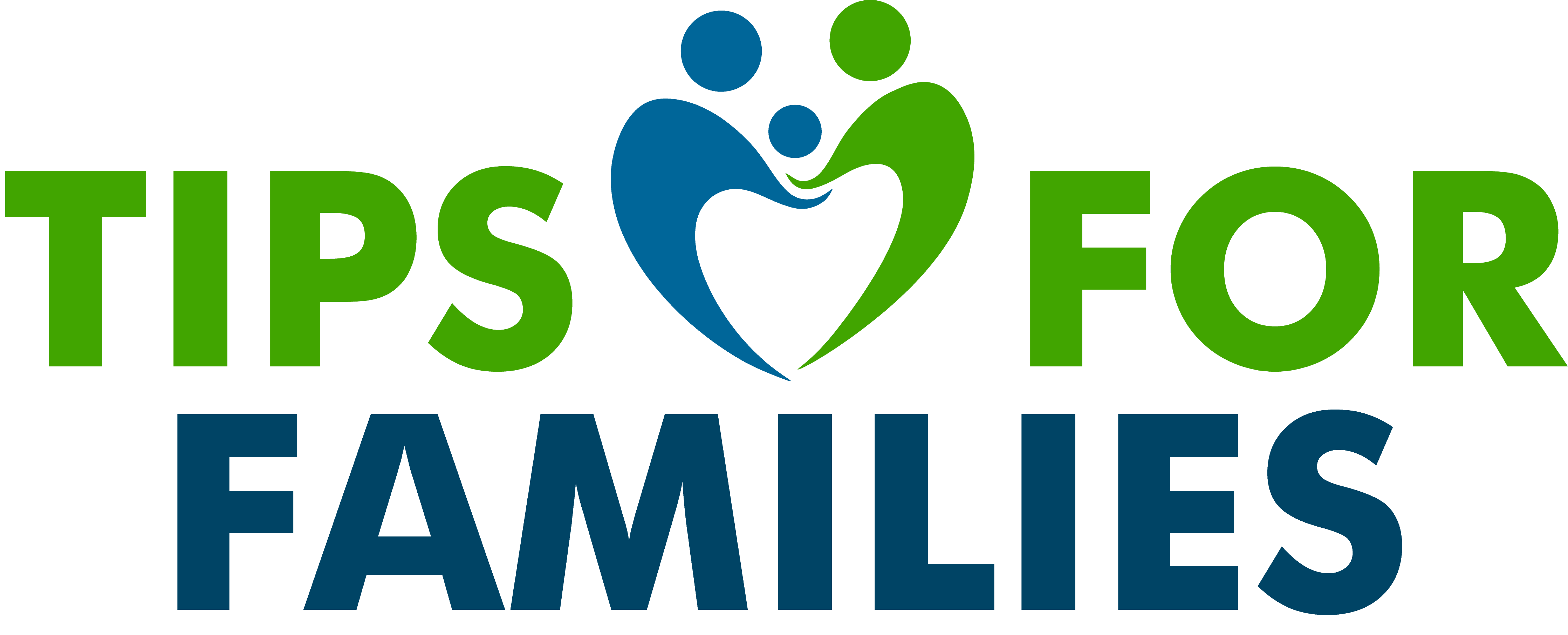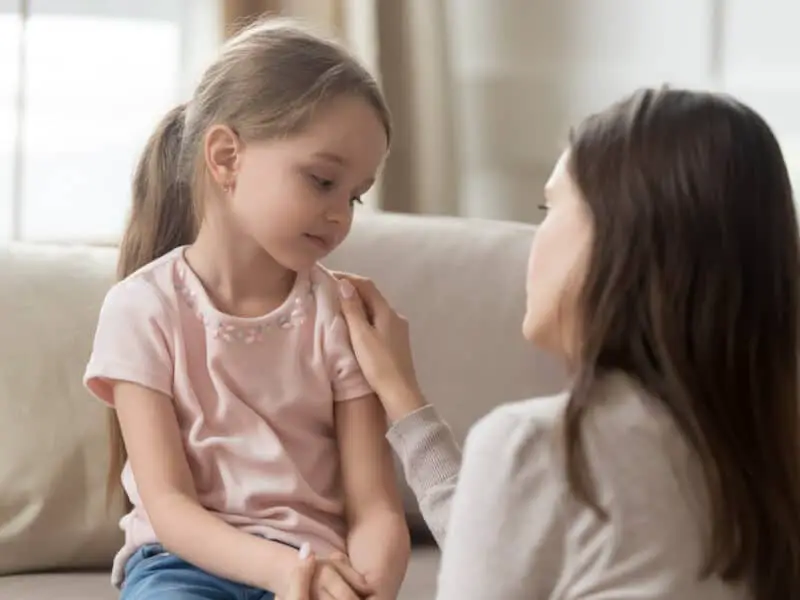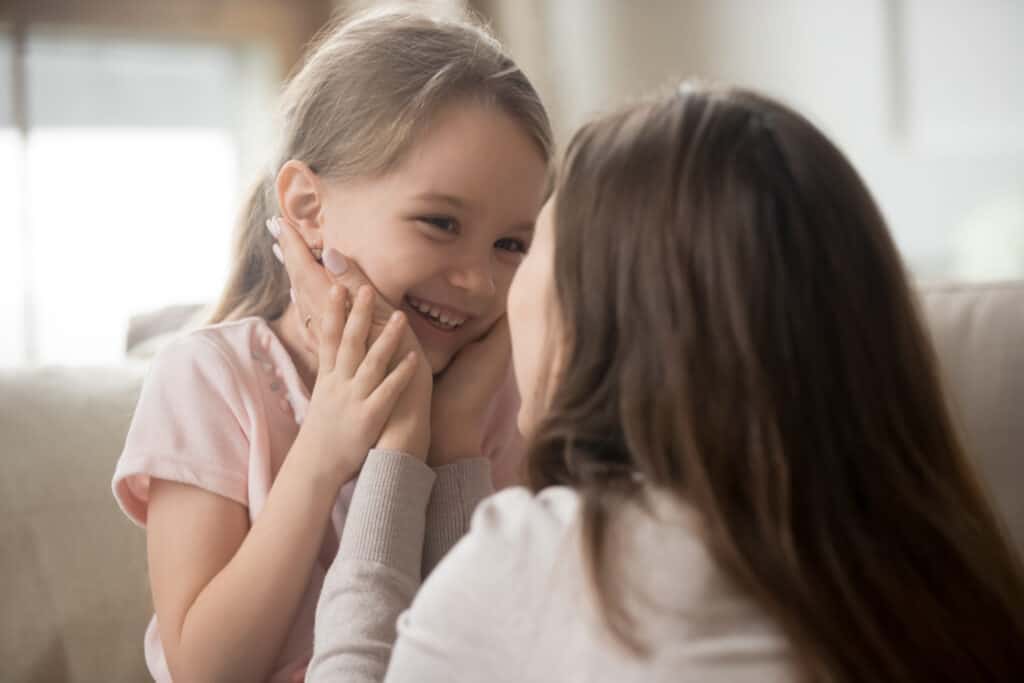Here is the thing – when parents use negative word, very few actually want to intentionally inflict pain. It is just them putting into words their emotions or state of mind at that instant.
In fact, few realize or even register the far reaching consequences of their negative words.
Actually, most believe that their children will simply understand that mommy/daddy was only angry or in a bad mood or was having a rough day.
Of course, kids don’t understand any of this. The only thing that lingers back with them is the ominous, dark cloud of the hurtful words.
Now, a few repeat episodes of your bad mood can leave your child with a life time supply of negativity as your voice will quickly turn into his/her inner voice.
But, here is the good news, it is possible to wipe away the negativity with positivity or to at least dilute the negativity enough to stop it from causing significant harm.
So, continue reading to know everything there is to using positive words with your children.
But, parents have to be draw the line somewhere and that’s when a few harsh things are said!
Let’s face it, the world around is literally drowning in negativity and not even kids are spared the tearing down that harsh words cause.
Now, imagine adding something like this to the barrage of negativity your kids already face:
- How could you be so stupid? (Child’s interpretation- Maybe I am stupid)
- Why can’t you be more like your older sister/brother? (I will never be as good /don’t want to ever be like my older brother/sister)
- I am tired of dealing with your ____ everyday. (Mommy/daddy does not love me anymore)
- Go to your room and clean it right now. (They just want me to do chores)
- When are you going to learn to keep your things in place? (I can never do anything right)
- You still haven’t finished your homework? (You are stupid hence it takes you so long to finish your school work)
Now, I bet most parents are nowhere close to saying what their children interpret from their words of reproach. However, folks, it’s only kids that we are talking about here. Also, being constantly judged or admonished takes a toll even on an adult, so imagine what it can do to a child.
Why do parents say all those hurtful things when they never mean them?
Simple, because most of us think that being firm gets things done. Besides, saying “no” requires less time and it is easier. However, often parents unwittingly cross over from being firm to being harsh. Also, it is only natural to interpret too much firmness as harshness.
But here is the thing (and I am talking about this from experience) – It is far easier to get children to listen to you and to continue listening to you when you build rapport and trust with them. Positive and encouraging words help you to do just that.
Moreover, berating kids constantly is bound to crush their still developing sense of confidence and self-esteem.
In contrast, positive words not just place a premium on optimism and positivity but also build character and the lifelong understanding that it is possible to get results and get things done while keeping a grip on your emotions.
And that, my dear friends, is one of the most valuable life lessons that you can teach your child. Plus, encouraging words also help to:
- Provide the acceptance and reassurance that kids need to survive today.
- Build resilience to combat everything that comes their way in adulthood.
- Create the foundation for developing self-confidence and an optimistic mindset.
- Enhance self-esteem and the child’s belief in his own capabilities.
- Improve the emotional environment at home.
- Create a strong and safe family support system that the child can rely on.
- Encourage children to work harder without the fear of being judged.
- Foster creative thinking and imagination.
- Motivate children to take initiative.
- Have a profoundly positive impact on perseverance and determination.
Remember parents, your child is not going to simply understand your love and concern for him/her.
Children are yet to develop an understanding of the concept: “Actions speak louder than words”. Till then, your words are all they have with which to navigate this cruel world.
But, how exactly do you replace the negative with the positive?
I am strictly talking about toddlers and pre-schoolers here. Children in this age group have a hard time deciphering the meaning of negative words. Sure, they understand what the word “Stop” means.
But, when you use a phrase such as, “Stop it” with a 3 year old, who is trying to push his older siblings buttons, his brain questions, “Stop, what?”
Along the same lines, a phrase such as, “no cookies”, elicits a mental response such as, “why not or if no cookies, then what?”
If you use something like “Stop running”, the toddler brain questions, “Stop running and do what instead?”
Do you see where I am going with this? What you essentially do with negative words like stop, knock it off, no and others is give the child’s brain too much to process.
Instead, choose simple over complicated by telling them – What to do, and not what they should not do? Let’s try this out with the 3 phrases above.
- Stop it – You should be nice to your sister/ be nice to your sister, please.
- No cookies – You can have cookies if___ or you can have cookies after dinner.
- Stop running – Walk please.
Positive interaction with your children is not just about removing words like “no”, “stop” or “don’t” from your vocabulary.
Your aim should be to eliminate or limit your use of all words that smack of negativity. Let me give you a few more examples here:
- You should (too much of a command that can even be disparaging depending on when it’s used) – You can (You appeal to the child’s sense of confidence and the desire for accomplishment)
- Try harder – I know you can do better/Come-on champ, give it your best (feels like you are rooting for your child).
- Don’t forget – Remember to ___, please
- You are being difficult about – I know you are sensitive about
- You are a bad boy/girl – I know, you can behave better
I bet, by now many of you must be wondering if all this positivity will actually yield results in terms of a change in the child’s behaviour.
You know, how even with adults, the right words have to be coupled with the right body language and voice tone?
Well, that principle also holds true when it comes to interacting with children. So, here are:
Ten Tips To Choose And Use Encouraging And Positive Language With Your Kids!
1. Don’t let your response come from a place of anger or exasperation:
This one is easy said than done and once again I speak from experience here, as a mother of 3 young children.
There are those days when every second has gone against you, you are at your wits end, tired out of your mind and when you are yearning for the damn day to just end, your kid chooses to be difficult.
How can you stop yourself from yelling in sheer irritation, “Stop it right now” or “How many times should I tell you not do this?”
First, I will warn you that this will take some practice and loads of self-control. Second, let me give you the 4 step plan.
- Pause: Stop yourself from responding as a reflex.
- Take a deep breath: This will calm you down.
- Plan: Think about how to turn the incident/action positive.
- Speak: Say what you want without increasing your volume.
2. Your voice can make a lot of difference:
The pitch of your voice and the tone begin to matter to children even before they develop the ability to comprehend the actual context of the spoken words.
Yelling and screaming at your children is nearly as bad as using corporal punishment. In fact, even when the words are not so harsh, a raised voice will convey the impression that you are very angry.
So, use your best “no-intonation” and level voice when you want to correct your child’s behaviour.
If the words are being used to encourage instead of correct, infuse as much feeling into them as you can, without turning the talk into a cooing sessions
3. Generalization never works, not with adults and certainly not with kids:
Saying something like, “You did good”, won’t make a splash with a child. If you ask me, I’d say a generalized statement like that comes across as phony praise to anybody.
Instead, try a more pertinent and specific approach by saying, “The way you helped out your sister was so amazing”. Your child needs to know what has earned the praise, as this will help him to choose that behaviour in the future.
4. Kids are little humans, not little fools:
There is such a thing as too much praise. You don’t want to send out the message that “your sterling of a child can do no wrong”.
Plus, when you praise all the time and for no apparent reason, you take away the novelty and excitement off it. No, I am not asking you to be frugal with your praise, just be honest and genuine.
5. Everybody likes the sound of their name:
As far as possible use the child’s name when saying positive and encouraging things to him/her.
6. Talk to your child, not over your child:
Eye contact is extremely important no matter who you are communicating with. So, unless it is absolutely impossible to do so, get down to your child’s level physically when talking to him/her.
7. Comment on what is instead of what’s not”:
Instead of talking about what the child did not do or could not do, talk about what he/she did well.
For instance, instead of saying that you did so well at the baseball game today (the one that he/she lost), praise how well he handled the bat or his team or how he followed the coaches instructions.
8. Say something nice just cuz:
Being mommy/daddy, gives us the hall pass to hug and encourage without reason. So, don’t forget to say, “I love you” or that “I love being around you”.
9. Some moments are tailor-made for positive words:
You know those occasions through the day like when it’s time to tuck in the little one or just before he/she heads to school or when he is feeling down or when he has a boo-boo. These are all cues to pour in the positivity.
10: Remind yourself to be positive with your little ones:
Believe me when I say this, using positive language with your kids is not something that you will start doing in a day.
It is a habit that you will have to cultivate gradually. So, treat it like a habit that you need to work on, instead of something that you can pick up overnight.
The Big List Of Positive Things To Say To Your Child
1. Just cuz positivity
- I love you.
- You mean so much to me.
- I love hanging out with you.
- I love that you are here doing ___ with me.
- I am proud of you.
- I believe you.
- I know you can ____.
- I believe in you.
- You are so beautiful/handsome.
- You are so smart.
- You make me smile.
- You make me proud.
- I think about you all the time.
- I was thinking about you when___.
- I love you no matter what.
- We are in this together kiddo.
- You can tell me anything.
- We can talk about it anytime you want.
- Do you want to tell me about____ (be gently persuasive with this one but not too much)
- You mean the world to me.
- I am grateful for you.
- Thank you.
2. Positivity to encourage and empower
- Your choice matters to me.
- We can do things your way.
- Let’s try to do that your way.
- You can be good at ___.
- You can be a great leader.
- You are so smart/intelligent.
- You are unique.
- You are so much fun to be with.
- It’s so much fun to do __ with you.
- You are so kind.
- You are so nice.
- You are so helpful.
- I know you can get through this.
- You are special.
- Follow your heart.
- You are such an honest boy/girl; you make me so proud.
- I will always be here.
3. Positivity to build rapport and understand your child
- Tell me what you are doing.
- Why do you like__?
- Why don’t you like ____?
- What are you feeling?
- What do you think about___?
- Your ideas matter.
- Do you like___?
- I forgive you.
4. Positivity for optimism and motivation
- Keep trying, and I know you will get there.
- I know you are not a quitter.
- You don’t give up, and that is the best thing about you.
- You kept going and that’s what makes you a winner.
- It’s not all about winning.
- So, what if you lost this one, there will be more___.
- It’s ok to be sad/nervous/to ask for help.
- So, you made a mistake, big deal; learn from it!
- Take a break and come back stronger.
- Always finish what you start.
- If you believe you can, you will.
- You can achieve anything that you set your mind to.
- Don’t give up!
- You did not give up even after ___ and that is what matters.
- Challenges are good; they give you opportunities.
- Always follow your dreams.
- Think before you speak/act!
- You can try again.
- Wow, you are working so hard!
- You got this!
- Get back up!
5. Positivity to deal with anxiety and fear
- Everyone gets scared sometimes.
- Nobody is perfect, and that is Ok.
- It is OK to not be perfect/__, all the time.
- Trust your instinct.
- Believe in yourself.
- What you feel is normal.
- Don’t be afraid!
- Have fun!
- Time out!
- Give yourself a break.
- You can find a solution to this if you just calm your mind.
- Start over and see how you can do things differently.
- All problems can be solved.
- You will get through this.
- Stay positive!
- This is not the end, just the beginning.
- There will be other matches/games/tests.
And there are hundreds more that you can add to this list. But, I believe I have managed to show you how positivity can help and how you can be intentionally positive when interacting with your children.
One Last Thing…..
If you find it hard to consciously say positive things to your kids, put this as an item in your to-do list for the day. Another way is to simply make up a list of encouraging things to say and post it where you can see it.
Of course, there will be those occasions when a stern “no” is absolutely needed. And if that is what the act/incident demands, don’t shy away from that “no”.
But, make up for every negative word used, with 4 positive words. They don’t have to follow the negative word.
However, make it a point to use 4 positive phrases through the day. This way, your child won’t go to bed thinking that you are angry with him/disappointed in him.


















 Best Trampoline With Enclosure
Best Trampoline With Enclosure